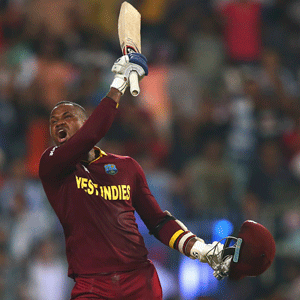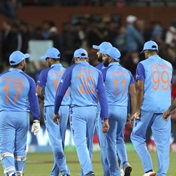
Cape Town – In the broadest cricketing sense, South Africa would be entitled to give the modern Caribbean landscape a wide berth as an educative model for excellence.
West Indies, in short, are still nowhere when it comes to competitiveness in the Test and one-day international landscapes: they lie eighth on the global rankings in the former -- the Proteas are third, and until recently ruled the roost -- and a more lamentable ninth in the latter (SA fourth).
So they can teach our country desperately little, frankly in the two most established arenas of the international game.
But the often volatile, sometimes fractious group of mostly island nations are increasing carving a uniquely specialist niche for themselves in T20, that noisy and cash-flush format getting up the nostrils of traditionalism ever more markedly: the Windies on Sunday animatedly, exuberantly became first double champions in the six-tournament history of the ICC World Twenty20.
There is little love lost between the West Indies Cricket Board and many of the globe-trotting stars – some might brand them soldiers of fortune – who make up their T20 squad, as clearly evidenced from captain Darren Sammy’s emotional critique of the governing body in his acceptance speech after his charges had seen off England in the Kolkata final.
Clearly in many ways the West Indies were fuelled, in the final and before it, by a sense of injustice which can be a powerful motivator in its unorthodox way, and not something especially applicable as a tool at present by the Proteas or any of the other major cricketing nations.
It is almost undeniable that there was widespread outrage within the SA squad just ahead of last year’s ill-fated World Cup semi-final against New Zealand, as a “political” storm back home over team selection disrupted their focus at an inconvenient time, but they weren’t able to channel that anger-driven adrenaline into earning the right result in Auckland.
Since then, that rumpus has seemingly settled down because even in a troubled past year collectively, the Proteas earned some notable bilateral limited-overs series triumphs, including beating India in their own environment in both formats and also Sunday’s losing finalists England 2-1 in a T20 series only a few short weeks ago.
Yet it would also be foolhardy for South Africa -- not yet even semi-finalists in six WT20 attempts and famously flaky in all multinational ICC events -- to flippantly gloss over the achievement of the generally unsung Caribbean side in lifting the crown twice from their last three attempts; the first was in Colombo in 2012.
Perhaps the biggest lesson to be taken on board was how palpably free of fear this Windies T20 unit is: their body language is constantly, theatrically upbeat in the field, and their dugout seems to take particularly extraordinary, visible pleasure in the ball being belted high into the rafters by whoever is smoking it at any one time at the crease – a fillip for collective confidence and gusto.
Admittedly burdened by the horrible, ever-swelling weight of tournament history, South Africa never managed to look nearly as much as though they were having plain, old-fashioned fun at the WT20 and it was sometimes reflected in rigidity of tactical approach.
Nor are this Windies bunch a one- or two-man type of show: bear in mind that the single-minded, designated primary master blaster Chris Gayle flopped in three successive innings – scores of four, five and four – following his whirlwind tournament-opening century against the very same England, but always there were others to willingly take over the big-scoring baton.
Similarly, the Windies’ tournament hopes were considered to have been impeded by the absence, through a banning over his bowling action, of their off-spinning banker Sunil Narine.
Instead leggie Samuel Badree, at the advanced age of 35, stepped up seamlessly to become one of the individual standouts of the entire event, including a highly influential stint of 2/16 from a full four-over quota in the showpiece.
Then there is the Dwayne Bravo factor: the outstandingly wily medium-pacer forms an invaluable bridge -- and by extension varietal asset -- between their faster bowlers and spinners and not without reason did pundit Mark Nicholas brand him “craftiest bowler” of this WT20.
There were times during the latest tournament that the Proteas’ attack, whenever Imran Tahir wasn’t operating, seemed dangerously too one-paced as one fast-medium bowler after another succumbed to the “harder they come, further they travel” phenomenon in this form of the game.
The closest things the Proteas have to a Bravo of their own are David Wiese and the much-maligned Farhaan Behardien, both sporting some clear, obvious imperfections but perhaps likely to stay thereabouts simply because of the need for something critically different when necessary on the bowling front.
Nor should South Africa be discouraged – albeit that there are dissenters on this score, too – from their quest to develop the presently erratic Chris Morris into a lower-order all-rounder of substance, not least because he seems one of those relatively rare South Africans who doesn’t allow adversity to smother his optimistic, relaxed outlook.
He may actually be the nearest thing we have as a No 8 boundary-clearing dynamo in T20 to a certain Carlos Brathwaite.
And goodness, didn’t he do a job on Sunday?
*Follow our chief writer on Twitter: @RobHouwing




 Publications
Publications
 Partners
Partners




